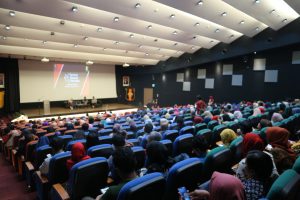 Depok – The Student Association of the Records and Management Study Program, Vocational Education Program held a National Seminar entitled “Records and Archives Disaster Management in the 4.0 Era” Monday (11/18/2019). Located in the Auditorium of Vocational Education Program, this seminar was attended by 370 enthusiastic participants. Participants came from various backgrounds and were dominated by record and archive managers from various ministries, agencies and private institutions in Indonesia.
Depok – The Student Association of the Records and Management Study Program, Vocational Education Program held a National Seminar entitled “Records and Archives Disaster Management in the 4.0 Era” Monday (11/18/2019). Located in the Auditorium of Vocational Education Program, this seminar was attended by 370 enthusiastic participants. Participants came from various backgrounds and were dominated by record and archive managers from various ministries, agencies and private institutions in Indonesia.
As a country that is right on the tectonic plate, Indonesia is very prone to disasters, from earthquakes, volcanoes, landslides, to floods. So that from the outset, the management of records must be designed in order to anticipate the disaster. “Moreover, we are currently entering the 4.0 era, the disaster factor still has to be watched out for in the management of records and archives,” said Dyah Safitri, Head of the UI Vocational Education Program Records and Archive Management Study Program when opening this seminar.
Present as a speaker, Rahmi, a lecturer in the Department of Library and Information Sciences, FIB UI, gave material about information behavior in Japan, which are also in disaster-prone areas. “The behavior of seeking disaster information must be developed in the community so that information can be obtained efficiently and reach related parties in the community,” said Rahmi. The next speaker was Raiwar Pratama from ANRI (National Archives of the Republic of Indonesia) who provided insight into how the archives created were received and managed as evidence and assets for an organization and individuals so that they must be protected from disasters. “Management of records and archives in the country has been equipped with various regulations regarding disasters and archive management,” said Raiwar Pratama.
In Chandra Yulistia’s view from the Indonesian Information System Audit Association (IASII), the current era is marked by three important things, information governance, digital archive governance, and IT governance. “The three will overlap and when a disaster occurs, the sustainability must continue,” said Chandra. He gave an example if currently school goods and service procurement transactions no longer use paper documents. Meanwhile, electronic transactions are not carried out in schools but in systems owned by online market partners and payment system partners. Another thing is the location of electronic data does not exist in schools but is distributed in data centers spread over various locations with different technology formats. So it is necessary to think about how to anticipate disasters, especially in digital-based archives.
The aspect of disaster management combined with archive management in the 4.0 era has become a breakthrough for record and archive stakeholders in Indonesia.


